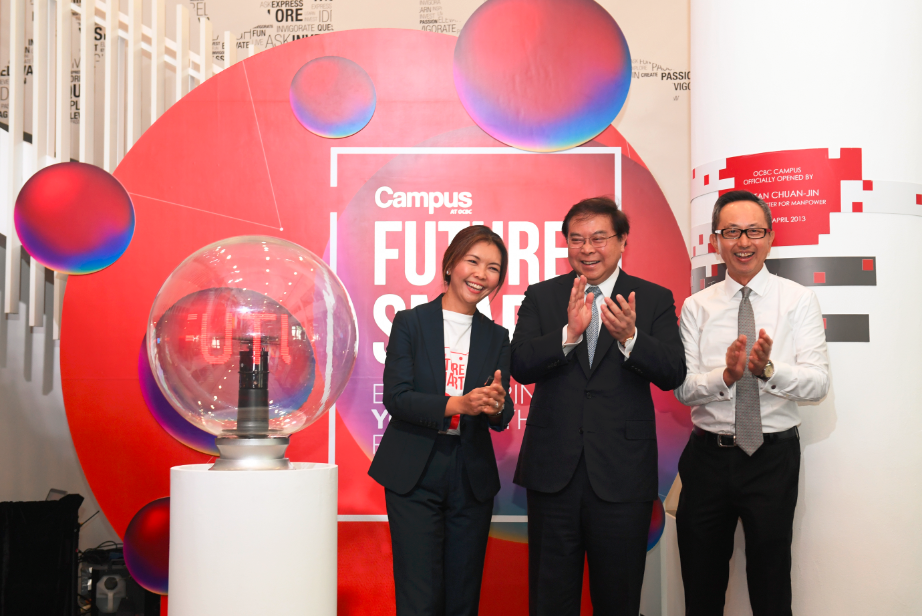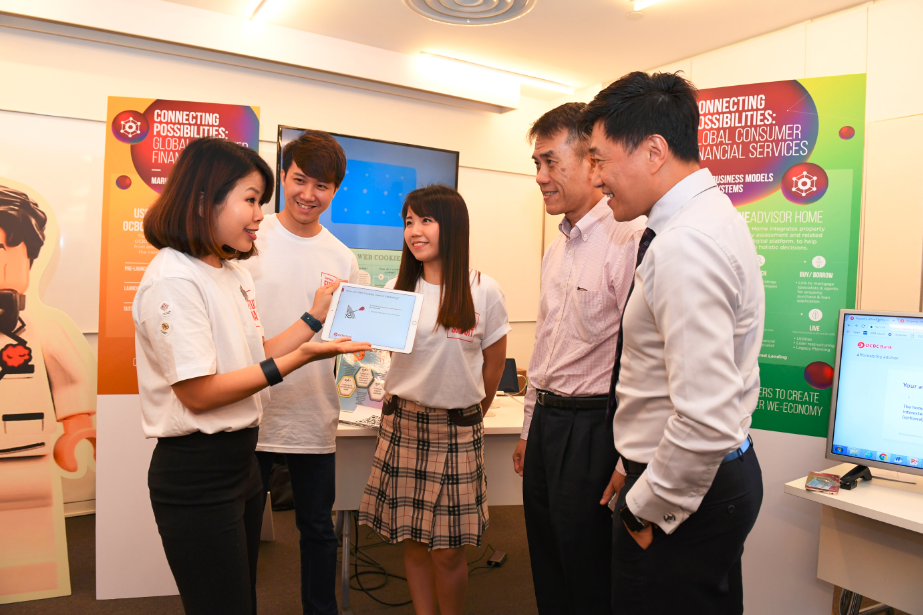
OCBC Bank Launches Digital Transformation Programme For 29,000 Employees
by Company Announcement May 8, 2018The OCBC Future Smart Programme makes it possible for a cheque processing executive to become a data scientist in three years.
Lim Chee Hau who has worked in the bank’s payment operations unit for five years, processes cheques on a daily basis. Through a rigorous digital curriculum and experiential learning, he could be a part of our big data team by the third year, spotting trends in payment-related data and making business recommendations that could lead to banking’s next big innovation.
With an investment of $20 million to train and develop the digital skills of all 29,000 employees of the OCBC Group globally, the OCBC Future Smart Programme is the largest-scale and most ambitious digital transformation initiative by a Singapore bank.

(L-R) Ms Yap Aye Wee, Head of Learning and Development, Group Human Resources, OCBC Bank (叶愛薇, 高级副总裁,集团人才资源), Mr Samuel Tsien, Group CEO of OCBC Bank (钱乃骥,集团行政总裁), Mr Jason Ho, Head of Group Human Resources, OCBC Bank, (何保华,总监,集团人才资源) at the launch of the OCBC Future Smart Programme on 7 May 2018.
The programme was officially launched by Mr Samuel Tsien, Group CEO of OCBC Bank, Mr Jason Ho, Head of Group Human Resources, and Ms Yap Aye Wee, Head of Learning and Development, Group Human Resources, at OCBC Campus on 7 May 2018. A two-day event (7-8 May 2018) which was organised for the bank’s employees, featured talks by thought leaders and experienced practitioners on all things digital, as well as innovation pods that showcased the bank’s latest innovations.
4 Qualification Levels, 7-Pillar Curriculum
To ensure that the employees can achieve the highest level of proficiency, they will go through 4 qualification standards specialising in 7 key digital domains.
The 4 qualification standards are:
- Awareness – understand terminologies and trends.
- Literacy – know case studies and real-life applications.
- Practitioner-level – apply digital skills in day-to-day work.
- Mastery – become a subject-matter expert, coach and industry thought leader.
OCBC Bank has identified 7 digital domains that are critical to attain digital competency in a well-rounded manner.
Called the 7 Future Smart pillars, they are:
- Digital Business Models and Ecosystems – Understand how new digital ecosystems function, the threats they pose and how we can leverage on them and create value to differentiate us from the competition.
- Technology and Data – Apply new technologies and data to better understand customer needs and make better business decisions.
- Customer Centricity – Innovate new approaches to customer value creation.
- New Risks – Understand new risks and how they impact us professionally and personally.
- Marketing and Communications – Understand and leverage new digital tools and platforms.
- The Way We Work – How to build an open and collaborative mindset to compete in the digital economy
- Leadership in the Future World – Learn to adapt leadership styles to build a digital culture
Within each pillar, a specially curated curriculum has been designed. The 7- pillar curriculum comprises a suite of 6,000 online programmes as well as speaker sessions, workshops and classroom learning, bringing the total number of learning programmes in the bank to 10,000 over 50 categories.
By the end of the Programme’s first year, all employees are expected to attain the Awareness level across the 7 Future Smart pillars. This will be measured using a digital online assessment.
Employees can choose to deepen their knowledge in one or more of the 7 digital domains by participating in the courses available in the next level of qualification standards. Upon completion of the modules for that level, the employee will be certified to have attained that qualification standard.

Employees at an innovation pod at the OCBC Future Smart Programme event.
Learning and Teaching Gigs
Another unique feature of the OCBC Future Smart programme is the use of the ‘Gig’ approach. It is a ‘Gig’ approach because employees can take up consulting ‘gigs’ with teams that are running digital projects on a freelance basis. External gig professionals will also be engaged to be part of the ‘Gig’ approach by conducting courses in their areas of expertise at the OCBC Campus. For a start, the bank is bringing in industry experts in human-centred design and agile methodology to impart skills on design thinking to employees.
Said Mr Jason Ho, Head of Group Human Resources, OCBC Bank,

Jason Ho
“The speed at which technology is changing can make us vulnerable – jobs that are here today may be gone tomorrow. Businesses must therefore take steps to ensure that employees have the digital competencies needed to thrive.
And it is more than just skills building. New technologies will continue to emerge so it is critical that we create a strong learning culture that encourages a mindset receptive to learning, unlearning and relearning.
“We want our employees to be proactive in looking at themselves and asking – will I still be relevant 5,10,20 years down the road, and what can I do to stay ahead? Our hope is that employees will carry this mindset beyond the workplace too, because digital plays such an important role in our personal lives and we need to continuously learn how new technologies can help us.
This is the motivation behind the OCBC Future Smart programme, and is in line with Singapore’s drive toward becoming a Smart Financial Centre and Smart Nation.”
Said Mr Lim Chee Hau,
“I believe that there is no end to learning and that it is important to keep up with current trends and what is happening in the world. The exposure to all things digital is useful so I can better understand how we can innovate to meet the needs of our customers.
And I believe that if I put my mind to it, I will be able to use the skills that I have picked up and applied it to my job, and maybe even have the opportunity to contribute to the bank’s digital projects in the future.”
The OCBC Future Smart Programme will first be rolled out to employees of OCBC Bank in Singapore, Malaysia, China and its overseas branches, as well as its subsidiary Bank of Singapore, before being extended to other subsidiaries, Great Eastern Holdings and Lion Global Investors.







